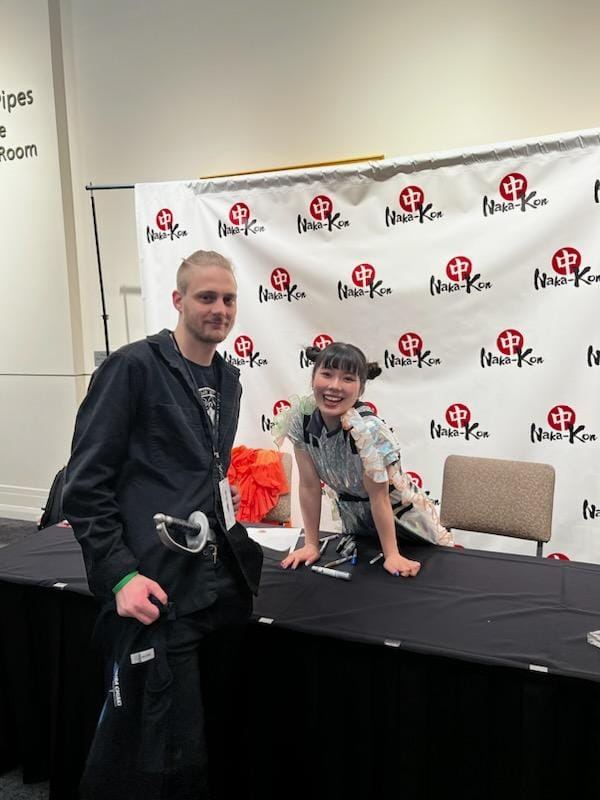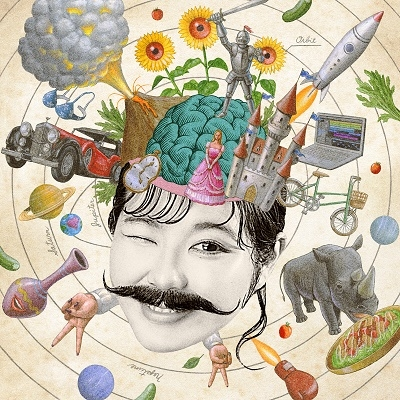Tokyo Idol Inspires Fans To Do Their Own Thing At Kansas City Naka-Kon
An
Interview With Chiaki Mayumura
by Graham Swanson
Chiaki
Mayumura travelled over 6,000 miles, all the way from Tokyo, Japan, to bring
Idol music to her American fans in the dusty plains and concrete towers of Kansas City, Missouri. She performed two shows
at Naka-Kon over the weekend of May 26th and 27th. Her
first show started late on Friday night. A silver suit sparkled over her
shoulders as she stared into the shadows of the hall with a smile towards the
stage lights. The audience looked up from the vapor when her voice rose to the
microphone. On stage, glowing under red lamps, her laptop and guitars gleamed.
As
the show went on, Chiaki took off her ruffled skirt, her shoes and socks, then called
on the audience to follow her. She exited the stage and ran like the wind
through the shadows. Youthful and mirthful men and women pursued her around the
corners of the room. More and more people entered the chase. She led them back
to the front of the stage and re-entered the spotlight.
After
Chiaki’s performance, I was honored to have the opportunity to stand next to
her during the midnight rave. She walked near the front of the stage and invented
dance moves on the spot. She stepped into a dance circle, put her hands and
feet on the floor, and pushed her hips into the air. Later in the night I
noticed her playing Limbo with costumed revelers from the audience and members
of her entourage. As the lights came on, I approached her.
Chiaki
and I walked out of the room and talked a little bit. She started making music
at age 20. She played at Kansas City once before and had a virtual concert
during the Covid Pandemic. We stopped walking in front of the heavy glass doors
that lead back to the hotel. She tells me how the film Bohemian Rhapsody inspired
her to write “Queeeeeeeeeen!” from her album Meja-Meja-Manja. She introduces
her kind entourage to me, and then I ask if she’d be interested in an interview.
After making some phone calls and taking my Instagram, she happily agrees.
The
second performance came Saturday night at 22:30. Chiaki performed a different
set of songs. She included “Queeeeeeeeeen!” and others that exhibited a
fiercer, more passionate Chiaki than the night before. Near the end of the show,
she rode on the back of a giant turtle held up by members of the audience. They
carried her around the dancehall, and she showered them in waves of elation. Early
that Saturday she performed with her acoustic guitar in the corridor between the
convention hall and hotel. Right after her last show she met fans and signed
merchandise for them. I worried that she might feel exhausted after such a busy
day, but she eagerly came over and sat with me, with a genuine smile and bright
eyes. A translator sat with us, and she responded in English for Chiaki.
We
began the interview.
 |
| Chiaki Mayumura meets fans after a show |
TRANSCRIPT
Graham:
Chiaki, I noticed, the songs, you changed them from last night. But you were still free spirited and
energetic. Were you always this way?
Translator:
She changes them every single performance.
Graham:
Why?
Translator:
She gets bored easily and wants to change them.
Graham:
Me too. I can’t stick to a routine to save my life. Have you always been that
way?
Translator:
Yeah, she has been that way for a long time, and she doesn’t want to write very
similar songs so she wants to create completely different songs.
Graham:
Can you tell me something about the Japanese music scene?
Translator:
Live music scene in Japan is very on Tic Tok side, or TV show side, and not necessarily
the people who do the live performances, being popular and selling lots of
music, and she gets frustrated by that. It’s more commercialized. Social media.
Graham:
I was going to ask you about that later. Thank you for answering that. What is
your greatest fear?
Translator:
That’s a great question. Her greatest fear is losing her fans. She doesn’t like
horror movies, but when she watches it, you know the tissue papers, they are
double layered, she would peel one off so she could see through. She’s watching
but not at the same time, she’s like filtering by having this one layered
tissue paper. She’s interested, she wants to watch it, she just gets too
scared.
Graham:
Don’t be afraid of the beauty of demons.
Translator:
She watched a horror movie on the flight to the United States, and then she was
scared of the passenger right next to her.
Graham:
Why would you lose your fans?
Translator:
For example, social media, or any platform, if she says anything political or
anything that isn’t related to Japanese society or society in general, she feels
she is going to lose fans and they are not going to be able to listen to her
songs and pieces of herself in the same way as before.
Graham:
I’m really glad you said that, because I was doing some research on Idol Pop musicians,
and I’m not going to lie there are disturbing things, I have some specific
examples here, I’ve been reading about things like mistreatment, things like suicide,
things like No Dating clauses in contracts, assault, slave labor contracts,
sexualization of minors. If this makes you uncomfortable, I understand, have
you experienced any of that?
Translator:
She has never really experienced anything extreme like to the point where she
wanted to hurt herself, but she has seen a lot of her friend who were very
pressured, like really a lot of contracts regarding their work, those kinds of
friends, their producers have the most power, every single power over them. So they
can’t make music, they can’t sing, they can’t express themselves like they want
to since they are fearful of the producers who have the power over everything. So
whenever her friends come up to her and say “what should I do” then what she
would say usually is “try to be yourself. Try not to be fearful of expressing
yourself”. For her case, she really doesn’t have a producer who has more power
over her, she produces everything, she makes her music, so she directs her own
shows, she does every single thing, so that’s why she’s never really
experienced something like that, but a lot of people in the industry experience
that kind of thing because of the producers having power over them.
Graham:
That is extremely interesting. I’d like to hear how you have overcome that. How
do you manage without a producer? What’s it like to do things by yourself?
Translator:
Japanese pop culture and society, they don’t really have a singer- performer
like her. She is almost unheard of, her style is so unique, she kept doing her
own thing, and kept writing and performing and she didn’t really have to rely on
any companies, any producers, so she just kept doing her own thing and she was
fine, so she thinks she’s very lucky. Rather than relying on somebody like
auditioning for a talent agency for example, a record company and stuff, its
better to keep producing yourself rather than trying to rely on someone else’s
power, and then the consequences of you being yourself, and you trying to do
everything, that consequence will follow up, will cause lots of fans and
supporters. So she just makes her own path, and then someone follows all the
time.
Graham:
It follows, eh? That ties into so many delightful things I wanted to ask you. How
did you come up with this style?
Translator: She used to be in Idol group, three of them, Chiaki and two other girls, and as
she kept performing as a group, she started feeling like everybody was so
similar, all the other groups and other songs are very similar, so she started
to feel like “I want to do my own thing, I want to create my own thing, that’s
not at all similar to anything that exists” and that kind of led her to establish her own style of music.
Graham:
That’s very interesting. What would you say separates you from the rest of the
Idols?
Translator:
What makes her different from other groups? Other people? Number one is that
she writes her own music, and number two is having a computer and a guitar by her
side and perform by herself. That style is not very popular in Japan. And the
courage and bravery of doing that all by herself. That makes her different.
Graham:
Bravery and what else?
Translator
and Chiaki: Courage.
Graham:
Good words. I can tell you have a lot of passion out there. I can see it. It’s
very physical.
Translator:
She started recently started seeing a lot idol groups where for example there
was a group of five but one of the five is a producer so as a group they are
self producing. She started seeing a lot of them coming up and she believes
that style of producing will produce less of the slavery, the contract work,
like where the producer has all the power over them. We will make the industry
better. A better place to work for artists.
Graham:
What else can I say, you’re really a source of positivity in all of this.
Chiaki:
Positive?
Graham:
I think so. How do your fans react when they see this bravery and courage
emerge from you?
Translator:
She says male fans start dancing with her, but female fans cry. They get really
inspired. But she doesn’t know why they’re crying from the stage. She always
asks “why are you crying?”
Graham:
Do you ever cry at the movies?
Translator:
She cries at parts where the audience doesn’t even cry, she still cries.
Graham:
Ok, like what?
Translator:
Things like a family having a good time, or not even a middle of the movie, the
beginning of the movie she’s already crying. Anything dog related.
Graham:
You’re very in touch with your sensitivity, aren’t you?
Translator:
she gets more emotional when she sees animals having a hard time or like being
hurt. For example, in Samurai era, the Samurais would fight with their swords
on top, while they’re riding horses, not even just swords, but guns too, so
whenever she sees any scenes where like (Imitates gunfire) and the horses is
like (imitates dying horse) she’s like “Nooo! Not the horses!”
Graham:
Spare the horses. You’re not alone.
Translator:
Not the humans. Rather humans be, and let the horses go.
Graham:
What did they do, they’re animals, they don’t know. Alrighty, thank you so much
for this. I think I have all my questions. Uhmm, I probably won’t put this in
the interview or anything, again I wanted to thank you, I was wondering what
you had planned for the rest of the night?
Translator:
She’s going to drink beer. That’s her plan. She usually doesn’t drink 24 hours
prior to a performance because her voice, her throat, but tonight she’s going
to drink to death.
Graham:
Awesome. I have some alcohol in my hotel room if I could join you.
Translator:
She wants to play uno the card game, and also teach her American friends the
drinking games in Japan.
Graham:
What are these games? – (audio cuts out)
 |
| Sai, Chiaki's latest album |
You can find more of Chiaki Mayumura's music on spotify.
https://open.spotify.com/artist/4DjusI9WuKLk3cmsJGtl8T
You can find her latest music video here:
